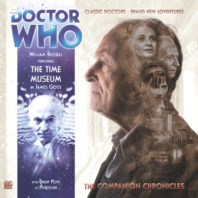
Released July 2012
To begin the seventh series of The Companion Chronicles which would lead into Doctor Who’s fiftieth anniversary year, writer James Goss with ‘The Time Museum’ returns to the First Doctor era with series stalwart William Russell reprising his beloved role of Ian Chesterton in the most unexpected location of a shrine to himself. With a man named Pendolin his only company in the shifting backdrops that traverse all of time and space, the two must examine memories and the context of character to continue progressing and avoid confrontation with a voracious enemy’s approach.
Given just how important Ian is not only to the franchise but to the very character of the Doctor himself, it’s wholly fitting that there should be an exhibit dedicated to his heroic travels in the TARDIS. However, Goss very clearly presents a tale of two distinct halves as Ian learns that creatures roving the display are actively robbing him of his memories and deliberately leaving him confused. Russell gives a superb performance in this segment by portraying the anguish and frustration of a man whose memories are just out of reach, but there is ultimately little to the first episode beyond Ian incorrectly trying to piece together fragments of different adventures into one. Losing memories is, of course, a fate that would come to befall some of the Doctor’s future companions as well, and it’s equally distressing to realise that such an important part of Ian’s life has been taken from him against his will while the evidence of those missing memories stares him back in what amounts to little more than a forgotten annex of a much larger complex.
As intriguing as this alternate history of Ian’s travels set within this environment that changes to meet Ian’s perceptions is, however, ‘The Time Museum’ becomes an altogether more exciting story once Ian realises that it’s in fact Pemberton who is taking his memories while learning that he has been taken out of his own time to attract the Doctor who never came. What follows is a thrilling match of wits and intelligence as both try to outsmart each other, and Ian using the premise of simply pondering the importance of remembering and sharing memories to manipulate Pendolin into being the instrument of his own defeat is masterful, highlighted by Ian triumphantly assuming control of the stolen time scoop to return home. Along the way, however, are incisive looks into just how thoroughly Ian and Barbara changed the Doctor for the better, and the tale of one simple rock again becomes arguably the most important when stacked against the lengthy list of much more profound and dangerous escapades.
‘The Time Museum’ in many ways is a nostalgic walk through the First Doctor era, and the direction and sound design do immense work to bring so many components of so many beloved tales to life again in a new and nuanced fashion. While fitting that Pendolin should want the Doctor who inadvertently becomes the prized exhibit he was never able to attain, Ian proves once again just how intelligent and capable he is even in his later years with his own truth in question. The story does take some time to truly ratchet up the tension and intrigue, but once it gets going it provides an emotional and gripping tale that ranks amongst William Russell’s finest performances by seamlessly blending classic and modern aspects that could only feasibly be done with the benefit of so much hindsight both within the narrative and from the listening audience.
- Release Date: 7/2012


Leave a Reply